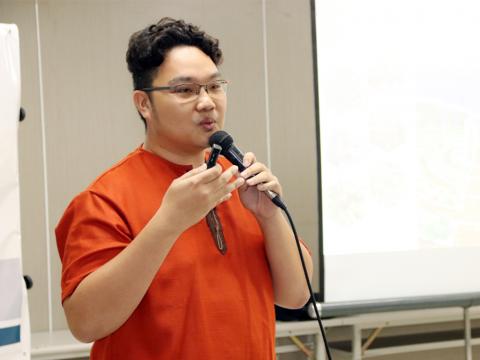University of the Philippines Los Baños assistant professor Ryan Rodrigo Tayobong discusses the goals and benefits of edible landscaping. (photo by Daniel Nilo)
DILIMAN, Quezon City—First-timers and regular attendees of the Agricultural Training Institute’s (ATI) free seminars affirmed their support to promote edible landscaping, especially in urban areas, to help ensure that food is safe and available to all Filipinos at all times.
In the latest ATI free seminar, which focused on edible landscaping, the attendees stated their commitment to advocate for the practice of growing food in free spaces within the home.
“This seminar is very informative. I will support this project of the Department of Agriculture and spread the word. I have been doing urban gardening but I only use pots. Thank you to ATI for holding this informative seminar that has a social impact,” said one participant from Caloocan.
Ryan Rodrigo Tayobong, an assistant professor at the University of the Philippines Los Baños (UPLB) College of Agriculture and Food Science, served as the resource person during the one-day activity. To kick off his presentation, Tayobong first talked about the significance of edible landscaping in the country.
“Today, we face the problem of increasing population rate. To nourish our growing population, we need more food. However, food production areas are decreasing because of land conversion, which leads to increased hunger and poverty rates. This is why the UPLB studied about edible landscaping to see how it can be applied in the Philippines,” explained Tayobong.
Tayobong described edible landscaping as a combination of the basics of landscape horticulture and vegetable gardening. He said that it is also a form of enticing people to go into gardening, particularly in urban areas which are prime lots.
“Edible landscaping is the science and art of producing food crops. It follows the elements and principles of design and, at the same time, promotes the practice of organic management system to produce your own food,” added the assistant professor.
Fruits, vegetables, and herbs are commonly used in this form of landscaping, Tayobong added. He also pointed out the difference of edible landscaping from conventional landscaping and vegetable gardening in that it focuses on using prime lots to produce food while making spaces aesthetically pleasing.
Prior to Tayobong’s presentation, ATI Partnerships and Accreditation Division head Renato Dela Cruz spoke to the attendees and underscored the importance of edible landscaping to help attain food security. He urged the participants to encourage their children to eat vegetables for better nutrition and to share their knowledge with their neighbors, friends, and family members.
Around 200 individuals from different parts of the country were present during the free seminar. This was held last July 12 at the ATI building in this city.

